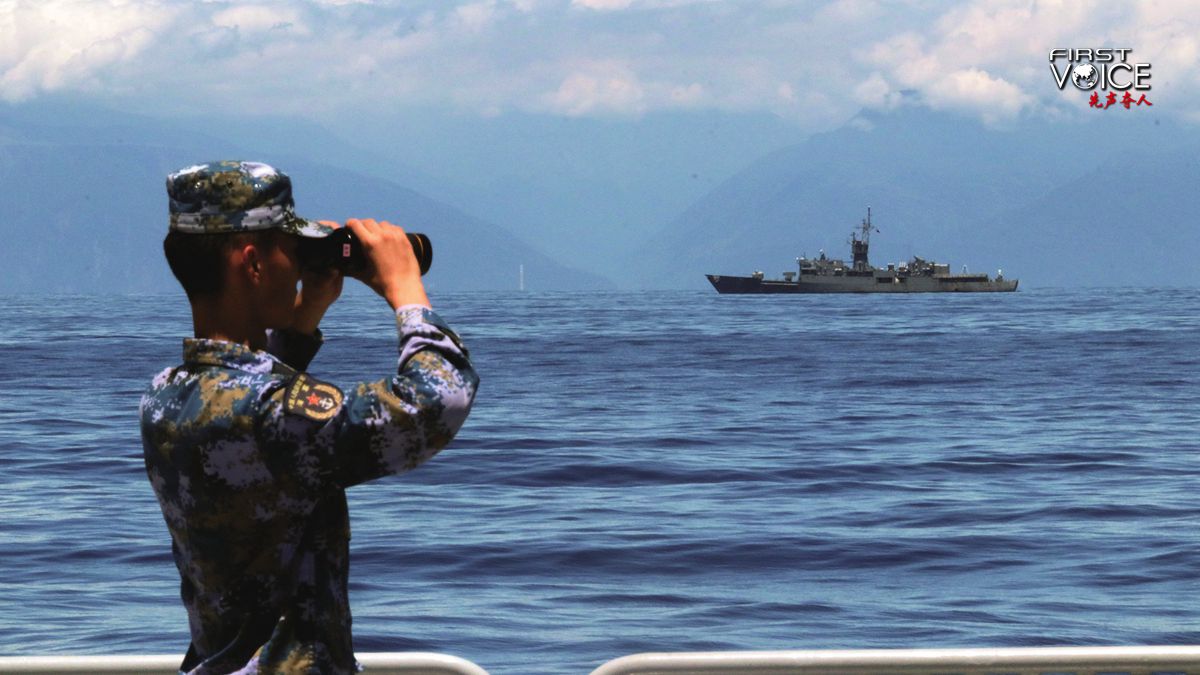
A PLA soldier looks around with a telescope near the waters around the island of Taiwan, August 5, 2022. [Photo/Xinhua]
Editor's note: CGTN's First Voice provides instant commentary on breaking stories. The column clarifies emerging issues and better defines the news agenda, offering a Chinese perspective on the latest global events.
Talking against Taiwan's independence, the U.S. has once again approved a new round of arms sales to China's Taiwan region. The potential $2 billion package includes the delivery of an advanced air defense missile system battled-tested in Ukraine, National Advanced Surface-to-Air Missile and radar systems, the Pentagon said on Friday.
Washington's "protection" is pushing the Taiwan region closer to the danger of military conflict.
China's strong will for reunification
In the face of repeated pro-independence provocations, the Chinese central government has promptly reiterated its strong will and determination for reunification. People across the Strait, who are one family bound by blood and linked by close economic interactions and cultural exchanges, will not let their relations be severed either.
True, peaceful reunification has always been the preferred option, but with the growing dangers of secession, military measures can also be considered.
It is worth noting that this year's Government Work Report omitted the term "peaceful reunification" when addressing the Taiwan question. The language change demonstrates the urgency of the fight against pro-independence provocations. Against blatant secessionist rhetoric and acts, the Chinese mainland has demonstrated its strong will to take any necessary measures including military actions, for reunification.
The fiercer the pro-independence forces provoke, the stronger the Chinese mainland will counteract.
Since Lai Ching-te assumed office as Taiwan's leader, the Democratic Progressive Party (DPP) has been earnestly "cooperating" with U.S.-led external forces for independence. This, beyond doubt, has prompted military measures by the mainland. The codenames of the drills "Joint Sword-2024A" and "Joint Sword-2024B," which followed Lai's pro-independence speeches in May and October, indicate that more and larger-scale military exercises will follow in case of provocations.
This time is no exception. Shortly after the U.S. announced the arms sale to the Taiwan region, the Chinese Foreign Ministry vowed to "take resolute countermeasures and employ all measures necessary" to defend national sovereignty, security and territorial integrity. On Sunday, Taiwan reported the mainland's "combat patrol" near the island, according to Reuters.
Peace and Taiwan independence cannot coexist in the Taiwan Strait. China's firm will for reunification means Washington's arms sale – though distinguished as "protecting" Taiwan – further pushes the region toward danger.
PLA's capability of reunification
From the Joint Sword-2024A, the Joint Sword-2024B drills and other military actions, the PLA has demonstrated its capability to simulate a blockade of the Taiwan Island and control the airspace and waters surrounding it.
For the first time, during the Joint Sword-2024A, the mainland's coast guard vessels entered waters near Wuqiu and Dongyin islands. Official maps of the drill areas showed that the vessels were sailing only about 2.8 nautical miles off Wuqiu and 3.2 nautical miles off Dongyin, dispelling the so-called notion of restricted waters imposed by the Taiwan authority.
True, the U.S. is selling weapons to the DPP, but these arms exports cannot pose any real threat to the PLA's operational capabilities.
Take Ukraine's so-called sophisticated National Advanced Surface-to-Air Missile System as an example. Although it represents a boost in air defense warfare that Washington is exporting to Taiwan, the system is primarily designed to intercept cruise missiles and its ability to intercept ballistic missiles is very limited, Chinese military expert Song Zhongping stated to the Global Times. This means Washington's arms sale cannot significantly enhance the island's air defense capabilities.
The huge gap between the mainland's military strength and that of Taiwan means that the latter would not be able to withstand a conflict.
The Chinese mainland remains ever-determined and militarily fully prepared for reunification. The more "protection" Washington claims to provide and the fiercer pro-independence forces become, the more dangerous the Taiwan region is likely to turn out to be.
Perhaps Washington is in utter denial, thinking that the approval of the arms sale to Taiwan would be used as a tool to contain China's rise. But reality bites: Its "protection" has sent a wrong and dangerous signal to the DPP, and its underestimation of the mainland's resolute determination for reunification will only backfire.
Apart from revealing how the world's superpower repeatedly contradicts its promise and interferes into other countries' internal affairs, the arms sale has seriously damaged China-U.S. relations, posing a threat to regional peace and stability. The old trick of playing the "Taiwan card" will only end up jeopardizing the U.S.'s national interests and future.

 中文
中文



